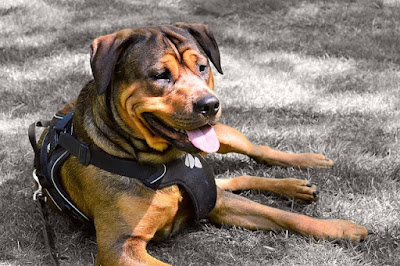Best Collars & Harnesses for Your Puppy
Your puppy never ask this question that "Does this kind of Harnesses make me look fat?". Style, while essential to human beings, is much less essential for a puppy than purpose. With all the alternatives on the market, how's a puppy owner to understand which equipment should select? Below are great tips.
Collars & Harnesses to Consider for Puppies:
Flat Collar with Quick-Release Snap- Ideal for holding ID tags and licenses, as well as for walking dogs who have learned to walk nicely, without pulling. Not ideal for dogs or puppies who pull; a lot of strain on the neck may cause a collapsed trachea. For safety, most people strongly like dog collars with quick-release snaps.
Martingale/Limited Slip Collar - Just like flat collar, but with an extra benefit: if properly fixed, these collars tighten up sufficient to avoid the collar from dropping over the dog's head in case he pulls back, without choking the dog. Even so, if wrongly fitted, these can tighten up excessive, and choke the dog similar to a choke collar.
Normal Walking Harness - On a "Normal" harness, the leash hooks up to a ring behind the dog's neck, therefore if the dog pulls, the pressure is on his upper body, not his neck. This is ideal for avoiding trachea injury for a dog which pulls, however, not ideal for handling a dog which pulls.
No pull dog harness with front clip - With this kind of harness, the leash attaches to a ring in front of the dog's chest area. This avoids trachea injury and helps handle a dog which pulls. Some experts advise that the pressure placed on a dog's neck by these harnesses can result in physical issues. Training your dog to walk correctly without pulling is the ideal choice.
Head Halters - A halter covers the dog's head and face, with the leash linking to a ring below their face or behind their head, based on the brand. While these are usually regarded as a "positive" training application, many dogs aren't attracted to halters, and it can take a fair amount of counter-conditioning to influence dogs to love them. For dogs who do well with them, they are an excellent application for handling a dog who pulls.
Never Use These Collars & Harnesses on Puppies:
Nylon Slip Collars - Also known as "training collars," these collars function by causing pain when the leash is jerked, and have a high chance of causing trachea harm. They may be useful when utilized with care and ideal timing by an expert - and they can cause worry, pain, and realized helplessness in a few dogs when utilized "properly" or improperly.
Pinch Collars - These collars function by imposing pain if the leash is jerked or if the dog pulls. They are less inclined to cause trachea harm than a choke chain, as the pressure/pain is spread evenly across the dog's neck, but they are still very aversive and never suggested.



Comments
Post a Comment